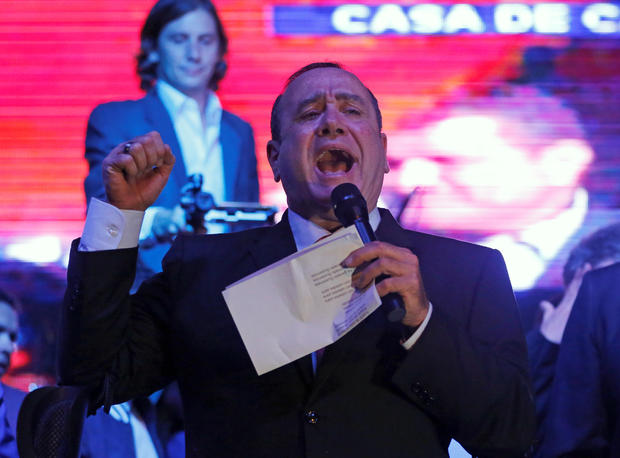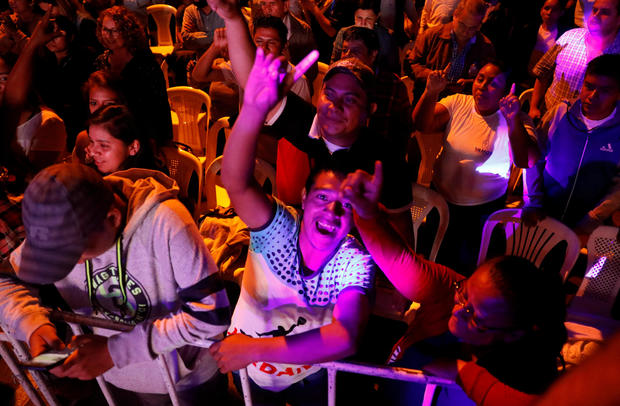Guatemala City — Conservative Alejandro Giammattei headed for an easy victory in Sunday’s presidential runoff election, garnering favor Guatemalan voters’ favor with his get-tough approach on crime and socially conservative values.
With about 98% of polling places reporting, the country’s Supreme Electoral Council said late Sunday that Giammattei had about 58% of votes, compared to about 42% for former first lady Sandra Torres.
Turnout appeared to have been low, suggesting widespread disillusionment with the political status quo in a nation beset by corruption, poverty, unemployment and migration issues.
Trending News
Running for the conservative Vamos party, Giammattei was making his fourth bid for the presidency. The 63-year-old doctor, who uses crutches because he has multiple sclerosis, stridently opposes gay marriage and abortion and endorses family values and the death penalty.
“We won. We are very excited, it is logical, it has been 12 years of struggle,” Giammatttei said in an emotional speech declaring victory. “Twelve years waiting to serve my country.”
He also took to Twitter, saying, “Thanks Guatemala! The confidence they placed in me will be the engine to continue our journey through a different Guatemala. Today I become the first public servant of the nation and together with the whole country we will work to make the government that you deserve.”
About 8 million Guatemalans are registered voters, but turnout might have fallen to as low as 45%, amid widespread disappointment with the administration of outgoing President Jimmy Morales.
Giammattei is to take office Jan. 14.
Guatemala is part of the so-called “Northern Triangle” of Central American nations that also includes Honduras and El Salvador. All three are under heavy pressure from the Trump administration to stem the flow of migrants heading to the United States.
On July 6, Morales’ administration signed an agreement with the U.S. that would require Salvadorans and Hondurans to request asylum in Guatemala if they cross through the country to reach the U.S.
Giammattei will have to decide whether to nullify or honor the deal, which could potentially ease the crush of migrants arriving at the U.S. border.
And he told the Reuters news service he hopes to amend it, saying, “I hope that during this transition the doors will open to get more information so we can see what, from a diplomatic point of view, we can do to remove from this deal the things that are not right for us, or how we can come to an agreement with the United States.”
The agreement is extremely unpopular in Guatemala, Reuters notes, pointing to a poll published this week in the Guatemalan newspaper Prensa Libre in which more than 80% of respondents said they don’t want their country taking in foreign migrants seeking asylum.
In addition to migration, Guatemalans have said they are concerned about crime, unemployment, the rising costs of living and entrenched corruption.
Torres was married to – and later divorced – former President Álvaro Colom (2008-2012), but has a record of her own as a businesswoman, having run a textile and apparel company.
Her campaign platform had focused on improving education, health care and the economy. She also proposed an anti-corruption program, but her Unity for Hope party has come under fire because some of its mayoral candidates have been accused of receiving campaign contributions from drug traffickers.
Oscar Argueta, the general secretary of Torres’ party, conceded defeat.
Guatemala City resident Leonel Regalado said, “I just hope Giammattei keeps his promises, and really fights corruption. We hope he won’t steal, because that would be too much, for him to steal as brazenly as Jimmy Morales has done.”
Rogelio Estrada, a father of two, was one of the first people to vote at a polling station in Guatemala City. He also said corruption was his main concern.
“Whichever of the two wins, they should focus on combatting corruption, because this administration (of current President Jimmy Morales) has been robbing us,” he said. “And whoever wins should focus on crime and employment, to keep more Guatemalans from going to the United States.”
The country’s general elections were held June 16, but no presidential candidate won the necessary votes to assume the post after the first round.
Three of the last four elected presidents have been arrested after leaving office on charges of graft, and Morales himself decided to disband and bar a U.N.-supported anti-corruption commission after he became a target for alleged campaign finance violations.
The campaign was marked by a chaotic flurry of court rulings, shenanigans, illegal party-switching and allegations of malfeasance that originally torpedoed the runs of two of the three presidential front-runners.
“The person who wins will have to lead a country that is viewed as a nation losing ground in the battle against corruption, because the mandate of the anti-corruption commission wasn’t renewed,” said Ricardo Barreno, a political science professor at the Central American Institute of Political Studies.



